Sunflower Scotland believes that the best way to help Ukraine is to buy humanitarian aid produced by Ukrainian producers in Ukraine. This will help Ukraine’s economy, sustain local jobs, fight poverty and pay taxes. In addition, it costs 58% less. Or in other words, for the same cost we can help 2.4 times more families. It is a much better use of our donors’ money
Why Sunflower Scotland buys aid in Ukraine?
Since September 2022 we have been buying aid in Ukraine. Why? There are three very good reasons:
1) Ukraine produces a lot of food, and it is 58% more cost effective to buy it locally. Ukraine is called “the bread basket of Europe”. The cost of aid bag per family – including food, personal hygiene and cleaning supplies – is about £6.83 when sourced in Ukraine. The same set of products purchased in the UK and shipped to Ukraine costs £16.29. It’s 2.4 times more expensive.
2) Buying Ukraine-made aid in Ukraine supports local jobs. In the time of war, there is a strong moral case to support local businesses, retain jobs, fight poverty, and pay local taxes.
3) We buy food that Ukrainians know, like, and (typically) don’t have allergies to. Regularly donated British food like Heinz beans isn’t the best option for Ukraine. Ukrainians like bulgur, which costs £0.25 / kg in Ukraine and £2.15 in Asda. They like semolina, which costs only £0.40 /kg in Ukraine. But in the UK it costs £1.67 in Asda and £3.00 in Tesco. Ukraine produces quality pasta from locally-grown wheat. It costs £0.49 / kg. In the UK, the cheapest pasta you find in Lidl costs £1.5 / kg: three times as much!
In addition, logistical companies profit from humanitarian aid. It costs £6,000 – £8,000 to send a 20-tonner lorry to Ukraine. For this money we can feed 800 families! We want donations to help people in Ukraine rather than enriching someone else.
What aid does Sunflower Scotland provide to Ukrainians?
We prepare 7.4 kg bags, enough for a few weeks depending on family size. Each bag includes a variety of basic, very nutritious food with long shelf-life. It’s much more than just pasta. In addition, we include essential washing supplies, toothpaste and toiler paper. Why? Because we support older people and families in frontline areas. Sometimes, the enemy shelling is very intense. If it’s risky to go out, people should be able to stay home for some time and not risk their lives.
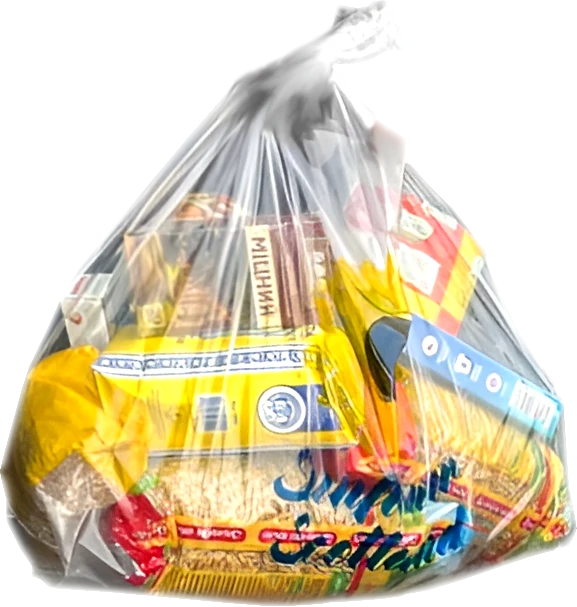
Here is a photo of our typical food bag. We delivered 277 of such bags to Novovorontsovka in the Kherson region, in December 2023.
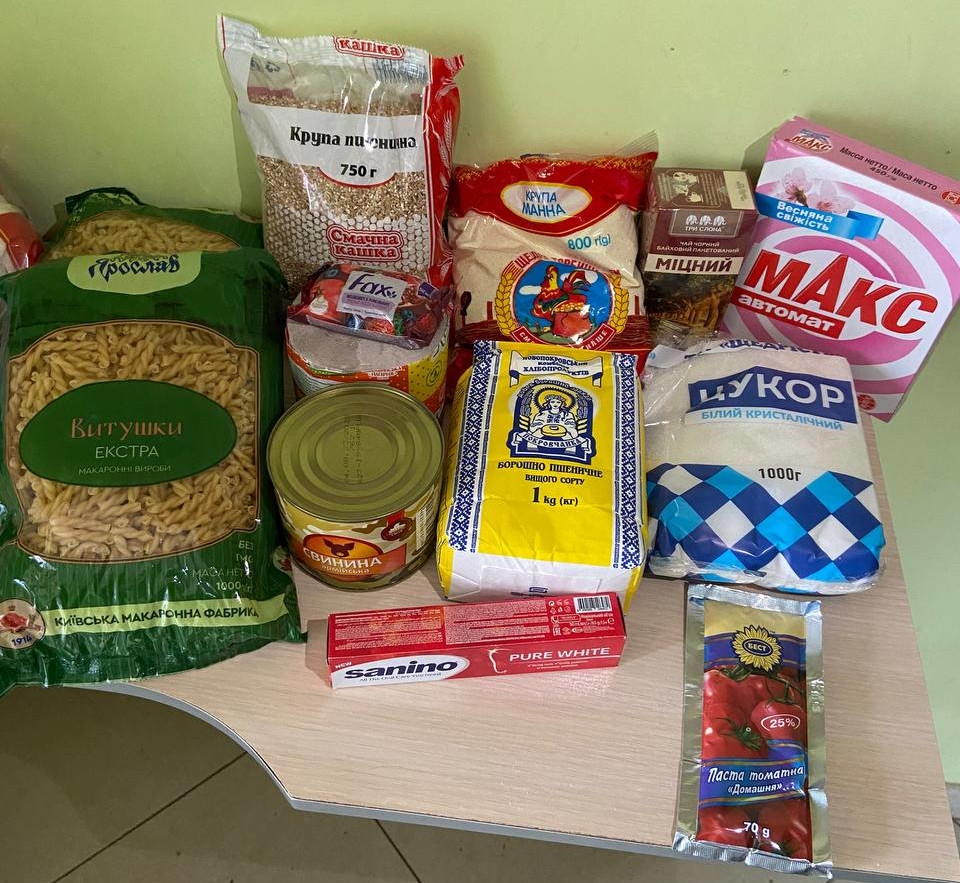
Here’s a detailed list of what we include in the bag:
Staple food
| Product | Quantity |
|---|---|
| Pasta | 2 kg |
| Semolina | 1 kg |
| Bulgur | 1 kg |
| Tomato concentrate (for soup) | 1 x 70 g stick |
| Plain flour | 1 kg |
| Sugar | 1 kg |
| Tinned beef | 1 tin (525 g) |
| Black tea | 20 teabags |
Cleaning and hygienic supplies
| Product | Quantity |
|---|---|
| Washing powder | 1 pack (400 g) |
| Toilet paper | 1 roll |
| Soap | 1 bar (70 g) |
| Toothpaste | 1 tube (50 g) |
Here are invoices from our purchases of food and household supplies, so you can see the evidence.
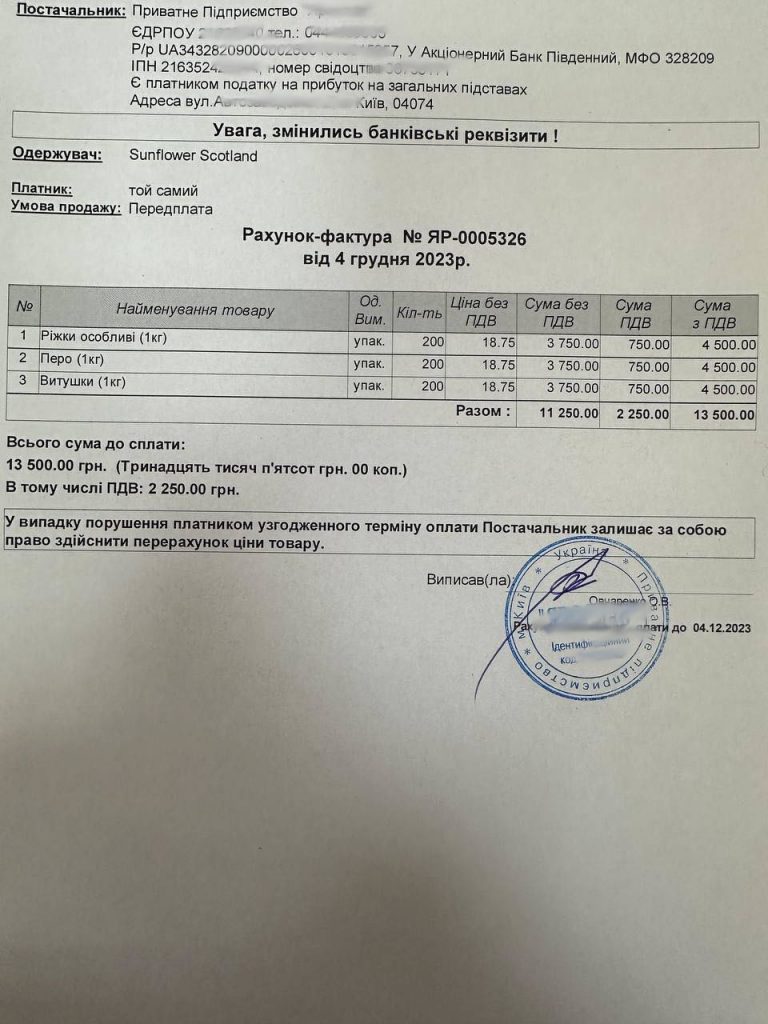
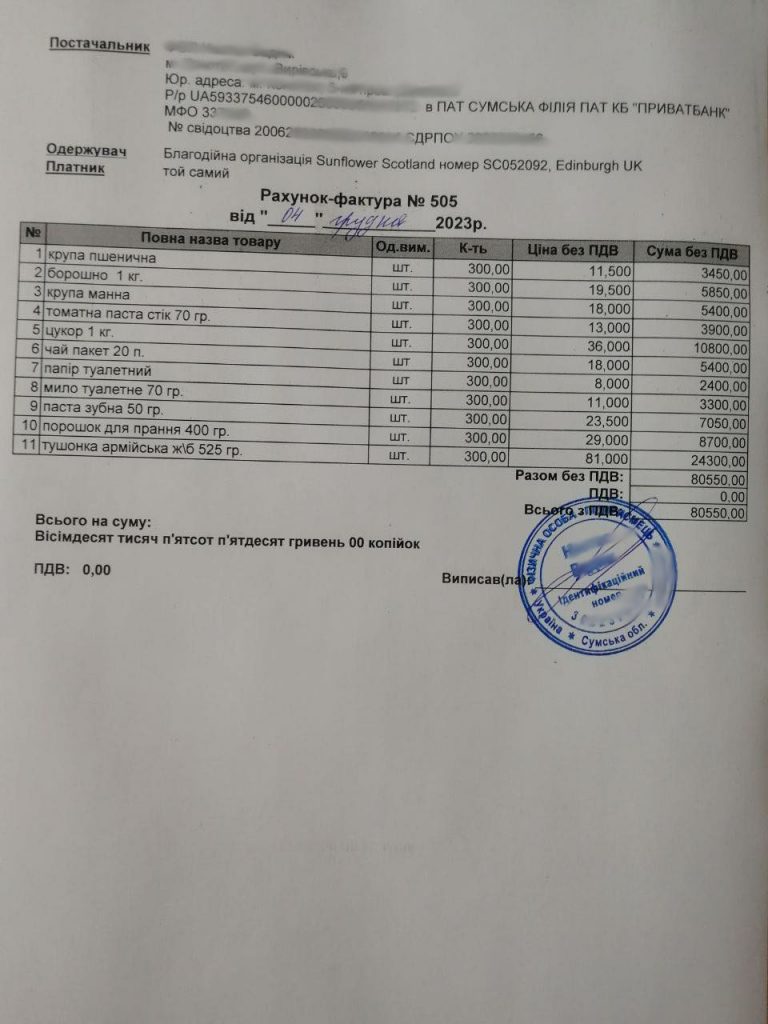
How much money do we save by buying aid in Ukraine?
By buying humanitarian aid in Ukraine, we can save £9.5 per family. When sourced in Ukraine, our aid bag costs £6.83. Comparing apples to apples, the cost of the same set of supplies brought to Ukraine from the UK is £16.29 per bag: £13.31 for products and £2.99 for shipping. It is 2.4 times more expensive than buying aid in Ukraine. In other words, Sunflower Scotland helps 2.4 times more families thanks to sourcing aid locally.
In real terms, for each £10 you donate to Sunflower Scotland, we buy 10.9 kg of aid in Ukraine. If we wanted to send aid from the UK, each £10 would buy only 4.5 kg of aid.
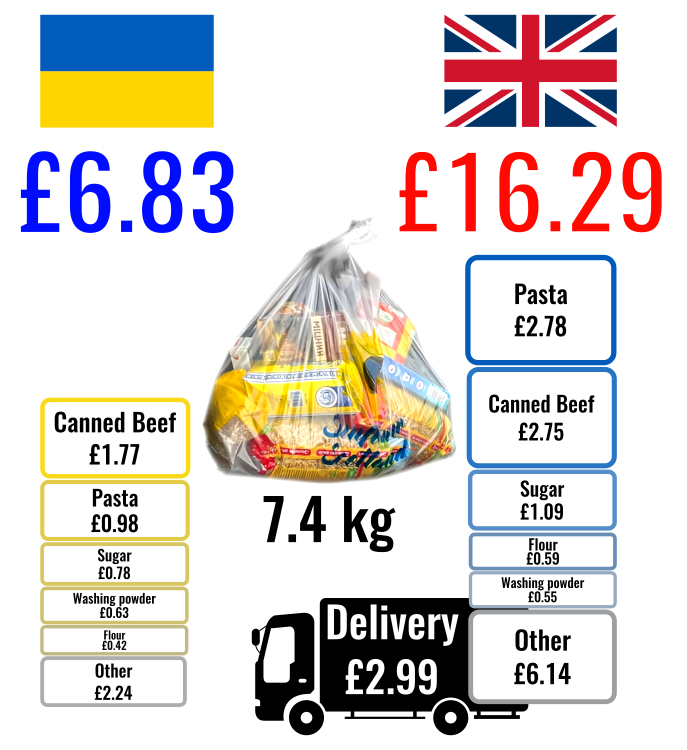
Let’s dive into it and check our cost comparison. In the UK, we use prices from lower-cost shops like Lidl or Asda, rather than upmarket chains such as Waitrose or Marks & Spenser. For instance we use the Asda Essentials range to compare to, as it is one of the cheapest options on the market.
For each product we adjust prices for the same weight. For example, we buy 70 gram soap bars in Ukraine. A really good UK alternative is the 125 g “Asda Essentials” soap bar, which costs £0.30. To do a side-by-side comparison we calculate the cost per gram and multiply it by 70. The adjusted cost of Asda’s soap comes down to 17 p per 70 grams.
Here is a table with all costs, so you can check our numbers. We also provide links to the shops where the information is taken from.
| Product | Cost, Ukraine | Cost, UK |
|---|---|---|
| Pasta 2kg | £0.98 | £2.78 Lidl |
| Bulgur 1 kg | £0.25 | £2.15 Asda |
| Flour 1 kg | £0.42 | £0.59 Lidl |
| Semolina 1 kg | £0.39 | £1.67 Asda |
| Tomato paste 70 g | £0.28 | £0.65 Asda |
| Sugar 1 kg | £0.78 | £1.09 Lidl |
| Tea (20 bags) | £0.39 | £0.39 Asda |
| Toilet paper | £0.17 | £0.27 Lidl |
| Soap (adjusted to 70 g) | £0.24 | £0.17 Asda |
| Toothpaste (adjusted to 50 g) | £0.51 | £0.25 Asda |
| Washing powder (adjusted to 400 g) | £0.63 | £0.55 Asda |
| Tinned meat (adjusted to 525 g) | £1.77 | £2.75 Asda |
| Shipping UK – Ukraine | £0 | £2.99 |
| Total | £6.83 | £16.29 |
The cost of shipping from the UK to Ukraine
The cost of sending a large 20-toner lorry to Ukraine is around £6,000. As a result, the added cost per each 7.4 kg bag shipped in this lorry is £2.99. We have lots of experience with sending cargo to Ukraine, and we know all the costs involved. Between March 2022 and August 2022 we sent ten lorries with aid from Edinburgh to Lviv, Dnipro, Kharkiv and Odesa. We did everything, from sourcing food in the UK and collecting donations from people, to loading by hand, to hiring lorries and preparing export-import paperwork.
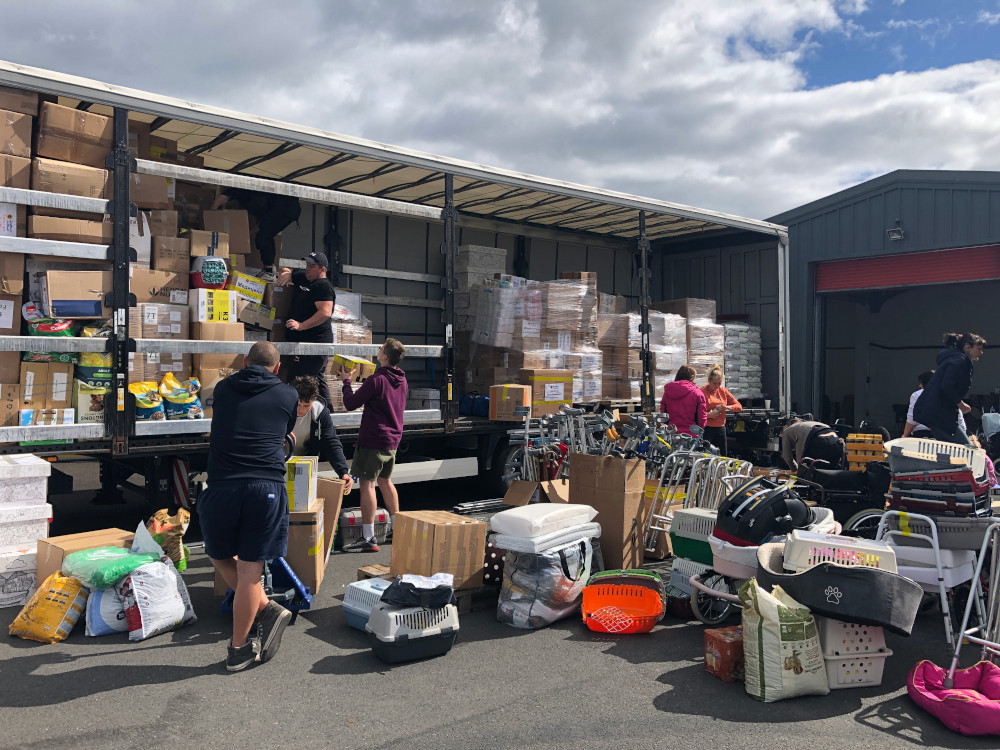
In practical terms, a 20-tonner lorries carry about 15 tonnes of cargo, even if you load it to the brim. It’s because some types of products (pasta, cereals) are lighter, and take up a lot of space in the trailer. Other foods, such as flour or tinned meat, are very dense and heavy. They should sit at the bottom of the trailer, and cannot be stacked up to the roof. Their heavy weight may tilt the trailer and it may capsize. So you always load the bottom of the trailer with heavier stuff, and the top with lighter items. In addition, there’s a lot of dead weight taken up by wooden pallets and packaging. Our team crawled many trailers like ants stacking bags and boxes with humanitarian aid.
The £2.99 cost per 7.4 kg bag is based on the best-case assumption that we can hire a lorry all the way from Scotland to East Ukraine – Kharkiv or Kramatorsk – for £6,000. But in reality this is hardly possible. Lorry operators don’t want to risk their precious vehicles and send them to the war zone.
Most likely, one can send a lorry to Poland. There it will be unloaded, and reloaded to another lorry going to hubs near the war zone: Dnipro, Kharkiv, Kryvyi Rih or Odesa. You would need to buy extra fuel, rent warehouses along the way to re-load the cargo, and pay men to do the job. This is a complex, and much more expensive operation. The true cost of logistics will be much worse, maybe as high as £4-5 per each aid bag, but it’s hard to quantify.
The bottom line is, war-zone logistics is expensive. The money spent on shipping is not spent on helping people, and if we can buy locally we shouldn’t reinvent the wheel.
Conclusion:
Sunflower Scotland’s example shows that the best way to help Ukraine is to buy humanitarian aid produced by Ukrainian producers in Ukraine:
- Firstly, because it is 58% more cost effective. The cost of aid bag per family – including food, personal hygiene and cleaning supplies – is about £6.83 when sourced in Ukraine. The same set of products purchased in the UK and shipped to Ukraine costs £16.29, or 2.4 times more.
- Secondly, buying Ukraine-made aid in Ukraine supports the local economy. It helps to retain jobs, fight poverty, pay taxes, and sustain the country in the hard time of war.
- And finally, we buy food that the Ukrainians like, know how to cook, and usually don’t have allergies to. Food donated in Britain is often spicy or unfamiliar (curry rice, Heinz beans, etc.), especially to older people.
There is a moral reason to buy humanitarian aid in Ukraine. We believe that the experience of Sunflower Scotland demonstrates that there is a strong economic case as well.
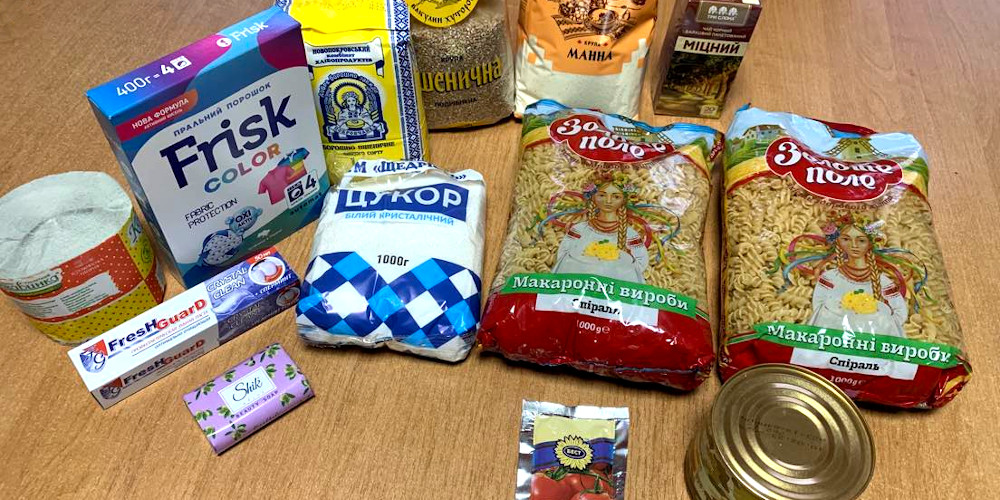
2 Comments for “Help Ukraine: buy Ukrainian and save 58%”